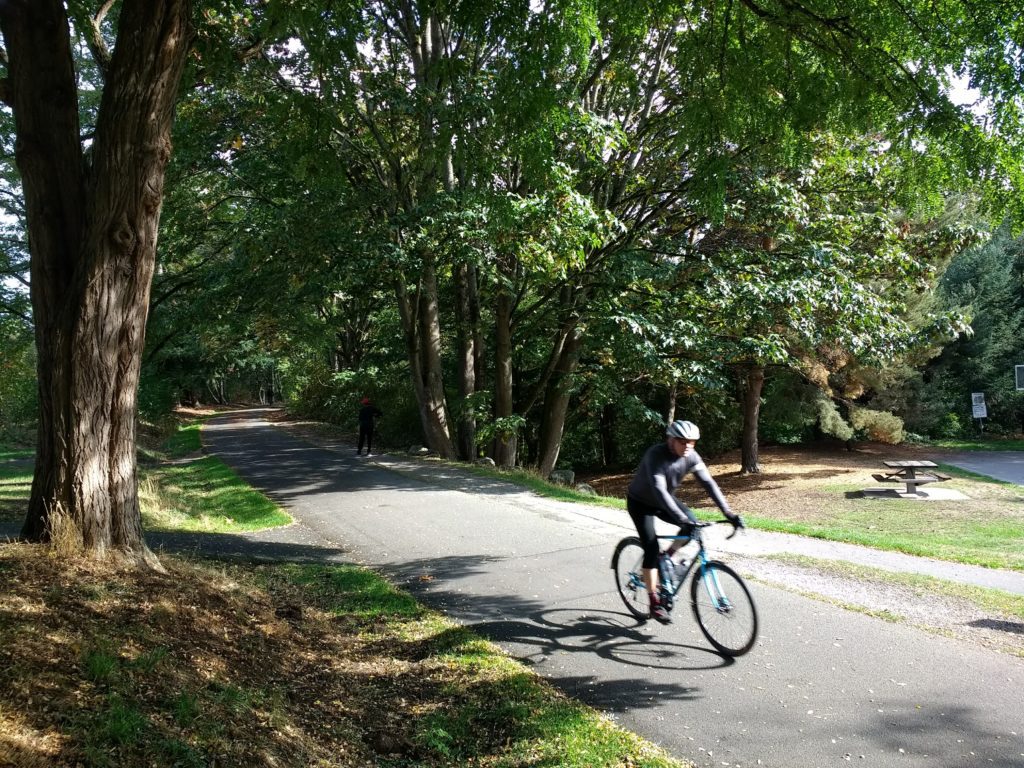

Community asked to follow public health guidelines and to not congregate
Seattle Parks and Recreation (SPR) encourages everyone to follow public health guidelines and to practice social distancing to help prevent the spread of COVID-19. While our community centers and pools are currently closed, SPR parks, open spaces, and trails are currently open (with the exception of the Japanese Garden and the Volunteer Park Conservatory).
Community members are welcome to use our park spaces but please do not congregate, and we ask that you please follow public health guidelines. According to Public Health – Seattle & King County, close contact between people should be avoided (social distancing means staying 6 feet or at least arm’s length away from others).
We’ve put together a list of additional things you may want to consider if planning to visit a park.
Visiting a park? Here are some things to consider:
- Consider visiting a new park: Do you love walks around Green Lake? We do too! But as one of our most popular parks, now might be a good time to consider visiting a less crowded park with more open space and more trail options, like Ravenna Park. Seattle has nearly 500 parks. Find one here: http://www.seattle.gov/parks/find/parks
- Think open space and trails: We support community members in thinking of ways to connect with nature and get in some exercise while practicing social distancing, such as going on a hike (we have miles of developed and semi-developed trails–find one here) or playing catch with your family at a field. While all organized athletic events have been canceled, our fields are still open for unorganized play.
- A small dose of nature can do wonders: Studies show a quick trip to the park can boost your mood: “Just 10 minutes of exposure to nature, two to three times per week, produces mental-restoration benefits. And short nature timeouts can happen in small, urban green spaces or your own backyard.” (Read more here).
- If able, think about going further afield: We are blessed to live in an area surrounded by trees, trails, mountains, and incredible outdoor opportunities. If you are considering visiting a park and are able to travel further afield, now may be a good time to explore some or our region’s larger or more remote natural areas, which may be less crowded.
- Can’t get out? Explore virtual options! There’s nothing like getting outside, feeling the sunshine, breathing in fresh air and connecting with nature. But during these difficult times, we recognize that the opportunity to get outside is going to be limited for many. Several organizations have put together great free resources for online exercise classes, virtual at-home workouts, and other ways to explore your world and connect with others remotely. SPR is also working to explore virtual fitness and recreation programming and we will have more information about these opportunities soon. In the meantime, check out these resources:
- Virtual tour of 7 spots along Seattle’s future new waterfront!
- Five National Parks: In-Depth Virtual Tours
- Explore these 31 National Parks in 3D with Google Earth
- Virtual City Walks Around the World
- Grand Canyon Virtual Walk
- Wailea Beach Path, Maui (with only nature’s sounds)
- Live Webcams from Around the World
- Yoga for Kids
- Virtual Tours of Top Art Museum Exhibits & Collections
- Live Cams at the Monterey Bay Aquarium
- PopSugar Fitness Videos for All Levels, Times and Interests
- Low impact home workouts for seniors
- Yoga for All Levels and Needs
- Fun 1 Mile Walk Party! (slow and faster walking in place)
- Follow public health guidelines: Please follow Public Health – Seattle & King County guidelines, including the following recommendations:
- Social distancing: Social distancing helps slow down the spread of disease. Social distancing means staying 6 feet or at least arm’s length away from others.
- Outdoor gatherings for young people: Outdoor gatherings are less risky than indoors ones since COVID-19 spreads more easily when people are close together in confined spaces. Plus, it’s important for kids to get active outside time every day. Research shows that daily time for kids outdoors also boosts the health and wellbeing of the adults in their lives. Here are some steps you can take to keep children and adults safe:
- Continue to apply social distancing practices in these settings, like remaining 6 feet apart.
- Limit face-to-face contact.
- Repeatedly clean and disinfect any shared sporting equipment, especially objects touched with hands, like balls, bats, and playground equipment.
- Any parents or adults that join should practice social distancing and not participate if they are sick.
- Outdoor activities for teens: Social interaction is important to the mental health of young people. Teens that are symptom-free and without underlying health conditions can get together with small groups of friends at a time (again, the lower the number, the lower the risk). Low-contact, outdoor activities, like hiking and bike riding, are great ways for teens to socialize. Teens should avoid spending time in groups larger than 10 and crowded places, like parties, retail spaces, and movie theaters.
- Sporting equipment: Repeatedly clean and disinfect any shared sporting equipment, especially objects touched with hands, like balls, bats, and playground equipment.
- Stay home when sick or if at higher risk. Do not go out in public when you are sick. Public Health recommends that people at higher risk of severe illness should stay home and away from large groups of people as much as possible.
- Don’t touch your face: Avoid touching your eyes, nose, and mouth unless you’ve just washed your hands.